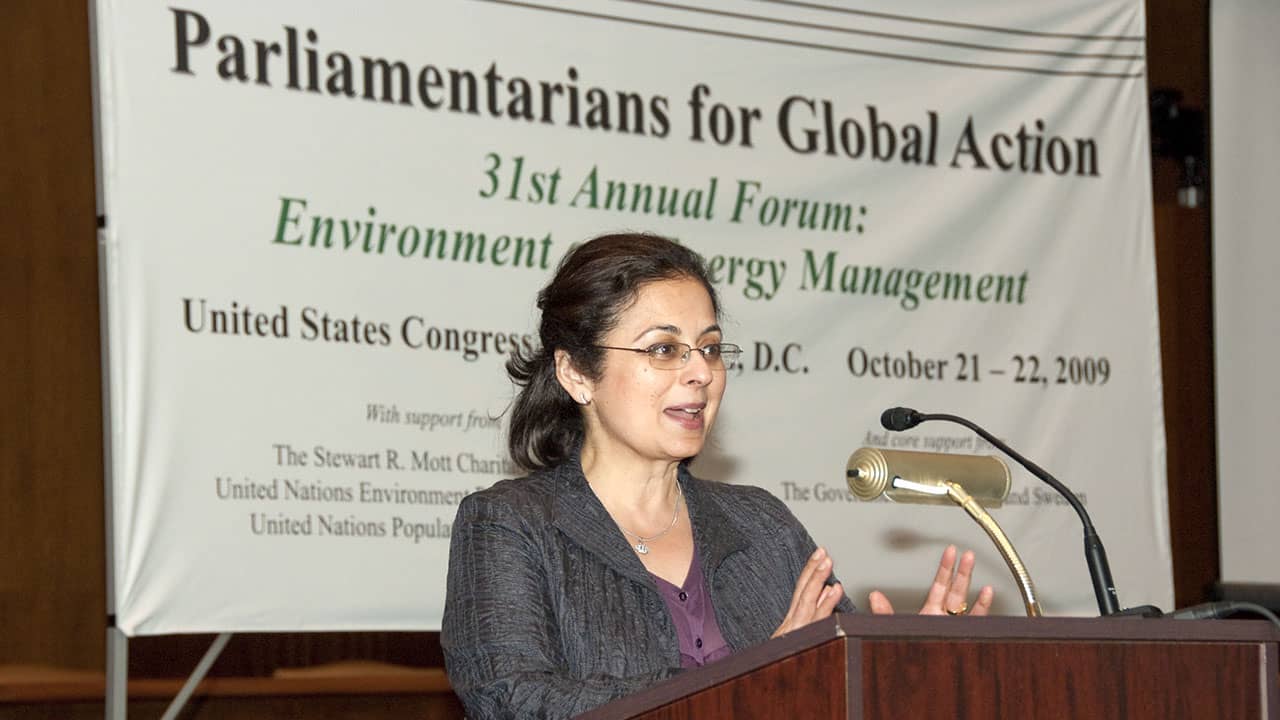Parliamentarians for Global Action: Highlights, 1996-2013
Visit the PGA Document Archive (1993-2013)
Download a complete programme of work from 1996 to 2013.

Parliamentarians for Global Action [PGA] is a non-profit, non-partisan organization of elected legislators from over 100 countries, that leverages parliamentary processes to promote peace, international law, sustainable development and reproductive health. Founded in Washington D.C. in 1978 with a focus on nuclear non-proliferation, PGA has successfully negotiated international treaties, from the Comprehensive Test Ban Treaty and the Nuclear Non-Proliferation Treaty to the Rome Treaty establishing the International Criminal Court; built international consensus for progressive national legislation on reproductive health, women’s rights and environmental standards; mediated in conflict zones from Azerbaijan to Cote d’Ivoire. PGA’s members include chairs of foreign affairs, defense, health and finance committees; its alumni/alumnae – ministers, heads of government and state.
As Secretary-General Shazia Z. Rafi identifies policy goals, conceives and initiates new projects, organizes teams from parliamentary members, senior UN leadership and secretariat staff to implement them. The Secretary-General is also responsible for fund-raising from governments, foundations and the UN system; for negotiation of sensitive political issues with member states and the UN including the Security Council.
Key Results:
Institutional:
Facing bankruptcy in 1996, PGA is now stable and growing. As Secretary-General, cut costs, diversified grants and introduced multi-year core and program funding. Increased accountability through governance reforms, including by-laws revision, Board rotation and term limits, and gender-balanced elections. Set up PGA’s United Nations Committee of senior Ambassadors and Business Council of senior executives as advisors on projects.
Since 1996, PGA’s Annual Parliamentary Forum has grown from a procedural gathering of members to an agenda-setting policy conference. As Secretary-General select subject matter, negotiate host parliament, raise funds and develop Forum topics into new PGA projects that become international policy:
- At Biennial Fora on the International Criminal Court (2002,2004,2006,2008,2010), members draft formal resolutions on controversial areas of the ICC that form the blueprint for national legislation and policy.
- Fora on Peace-building, Sustainable Development, Health and Women’s Rights (1996, 1997, 1998, 1999, 2000, 2001, 2005, 2007, 2009,2010,2011) have strengthened international consensus on Armed Violence, Environment, Reproductive Health, Women’s Rights,with increased national and foreign assistance devoted to these issues.
- Initiated Forum award 1996, the “Defender of Democracy” recognizing international figures for commitment to democracy, peace-building and human rights.
PGA was originally founded in Washington D.C. with strong congressional involvement which declined after end of Cold War. As Secretary-General, revived those ties with quarterly delegations of international legislators to US Congress since 1997; two Fora have since been hosted by the US Congress.
Programmatic:
As Secretary-General, with an academic background in international relations and women’s rights, advocated for expanded concept of Sustainable Development focused on women’s rights and reproductive health as central to human security. Built PGA’s membership of women legislators tripling percentage to 30% by 2009.
Initiated and led South Asian Health Diplomacy series (2004-2011) in collaboration with UN agencies and parliaments in Afghanistan, Bangladesh, India, Nepal, Pakistan and Sri Lanka, yielding new legislation and enhanced national funding for reproductive health and infectious disease programs. Currently developing SAARC parliamentary project based on regional peace dialogues held parallel to series.
As Secretary-General, led PGA’s legal and parliamentary teams in establishment of the International Criminal Court; from support for the Ad-Hoc Tribunals for the former Yugoslavia, and Rwanda to the final treaty in Rome 1998; to entry into force 2002. Of the 121 states parties to the ICC, 75 ratified through the work of PGA with advocacy built through the Annual Fora.
Conceived and organized first briefing by national legislators to the UN Security Council in 1996, with a delegation of Burundian legislators. Briefing led directly to adoption of SC Res. 1072, withholding of recognition for the military junta and restoration of the national assembly. Regular briefings followed for the SC on Burundi, Central African Republic, Cote d’Ivoire, Haiti, Lusaka Peace Accords; these briefings influenced UN policy on peace-building, the Peace-Building Commission established in 2005 included a strong, functioning legislature and women’s organizations as key pillars of lasting peace.
As Program Director for Democracy and Development, and later Secretary-General, developed new diplomacy tool of “Track 1 ½ Diplomacy” or parliamentary mediation. Since 1993 have led parliamentary peace dialogues between Armenia and Azerbaijan yielding cooperation on Caspian water management; Armenia and Turkey, yielding opening of official recognition; Greece and Turkey, yielding cooperation of Aegean water management and disaster management; and South Asian water-management dialogues yielding agreements between Bangladesh and India.“Track 1 ½ Diplomacy” was recognized by the United Nations’ Secretaries General who requested PGA intervention in Burundi, Central African Republic, Cote d’Ivoire, Haiti and Zimbabwe.
Conceived of project and led legislative team, comprising members from Catholic and Muslim countries, to a progressive consensus on Abortion (1993-1994), draft adopted by the plenary at the International Conference on Population and Development, Cairo, 1994. Projects on women’s empowerment and reproductive health in Islamic countries 1999-2009; launched OIC-wide women’s empowerment programme in Turkey October, 2010, with follow-up conference in Tunisia 2012.